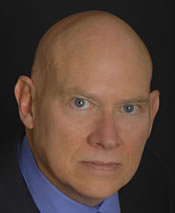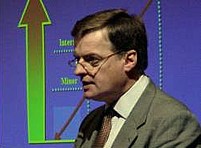6/25/2013· Crisis Management
Train Everyone, Including the Band
By: Bo Mitchell
The alarms are relentless, the lights are flashing, and you're offsite. Will your people respond appropriately to the threat or place themselves in harm's way?
By: Gerald C. Meyers and Susan Meyers
T: ((248) 851-6834
Email: gmprof@umich.edu
Profile on Experts.com.
Unorthodox OperatorsTaming Big Labor
|
Strong, well-organized labor can quickly cripple a miscalculating company.Any company bent on progress with a minimum of labor interference must keep its workforce watered and well-fed, and keep labor relations in apple-pie order.
But big labor and big business share a rich and nasty history. The relationship is historically and by nature adversarial. Stakes on both sides are always high, and emotions typically boil over, even when heated by the smallest flame. Both sides commonly expect the worst from the other and are already gnashing their teeth by the time they sit down at the bargaining table. It takes exceptional leadership to bring a company through a big labor confrontation unbloodied.
Sometimes the best approach to an old problem is to break formula, particularly when the circumstances are right. Executives Frank Vega, Peter J. Pestillo, and Gerald Greenwald astutely recognized a changed labor environment, then tackled labor problems in unorthodox ways. These executives boldly challenged entrenched, highly political industrial unions that were holding nooses around their companies' necks. Each broke ground using a different approach: one by matching himself to the needs of an historic labor experiment, another by outfoxing the enemy, and a third by�some would say�defiantly pouring gasoline on the flames.
The accused arsonist: Detroit Newspaper Agency CEO Vega. Vega sent this message to his company's unions: Hellfire and damnation, do it my way! A warrior, Vega busted his mighty unions with gusto and changed the newspapering labor landscape.
The fox: Ford Motor Company vice chairman and chief of staff Pestillo. Pestillo led negotiations with the United Auto Workers after sending this valentine: I love you, I love what you can do for me, so let's do it your way. A shrewd behind-the-scenes operator, Pestillo devised a labor agreement that brilliantly contained Ford's costs while punishing competitors.
The chameleon: United Airlines chairman Greenwald, who conveyed this supersincere message: Fellows, I'm sure we can work it out somehow. Greenwald, in a pathbreaking role, went on to bring labor peace at United and produce a nice profit.
Historical circumstances in the last two decades opened the door for executives like Vega, Pestillo, and Greenwald. The modern labor movement, born during the Industrial Revolution, had offered workers a way to bargain collectively for better wages and working conditions. Americans viewed organized labor suspiciously in its early years, but embraced it after the Depression. By the late 1940s and early 1950s, unions could claim as members about one in three U.S. workers. But early in the 1980s, after a quarter-century of political strength and relative peace, labor lost its momentum. President Ronald Reagan, once a Screen Actors Guild president and the only union member to serve in the White House, signaled the end of an era in 1981 by firing striking air traffic controllers, permanently. Strikes and work stoppages fell to 50-year lows. Union membership fell to less than 15 percent of the total work force. The public withdrew its knee-jerk support, and astute managers recognized that the time was ripe for new tactics.
Unorthodox problem solving in business, even under the best of circumstances, requires an iron stomach. Creative solutions in this world are often highly suspect. Big companies are far more comfortable living by boilerplate rules, no matter how stiff or stale. Most executives don't like to take chances. They live day by day, putting out fires and trying to please stakeholders. But sometimes circumstances require a big result, and that's when companies want someone competent and creative calling the shots.
Unorthodox operators are mavericks who are marked by their drive and talent. They welcome change, with all its messy disruption and rattling uncertainty, as a means to a better end. These leaders have the conviction and courage to see their efforts through no matter how many threats or derailments they may encounter. Unorthodox operators are risk-takers. They know that a wrong move can dismember their company, but they bear that risk without cracking.
These leaders succeed only with the undiluted confidence of higher-ups. Executives running public companies are typically responsible to shareholders through a board of directors, and sometimes a CEO. Second-guessing superiors will finish off a fresh effort, good or bad, before it has a chance. Detractors and naysayers are always out in full force during a company shake-up, and the media will publicize every perceived blunder. Without unqualified support, unorthodox leadership will be torpedoed or spitballed to death.
Nontraditional approaches to labor work best in companies that are in grave need of cost reforms, either via cost reductions or by growing without additional cost increases. These companies typically have considerable momentum in the wrong direction. They lost their way because they lacked a master plan. Companies like these cry out for radical change, and they can benefit enormously from a crisis, even if they need a leader to spur the company into one.
Labor-intensive organizations have the most to gain (or lose) in a labor conflict. The compensation, work requirements, health care, pensions, and peace of mind of tens of thousands of people will be affected, for better or worse, by the outcome. A poorly matched approach or lousy timing might take years to correct. Some companies never fully recover from an ill-advised disruption or work stoppage. On the other hand, the rewards of an unorthodox approach can be rich. A successful shake-up can unlock enormous profitability.
Vega, Pestillo, and Greenwald's approaches are instructive because they called these subtle shots so well. They had the timing, the backing, the skills, and the guts to challenge old thinking, and their solutions have become business landmarks.
Gerald C. Meyers is a well known industrialist, author, speaker, former Chairman of American Motors Corporation, active business consultant, and an expert in the field of Crisis Management in business. He is the Ford Distinguished Professor of Business at Carnegie Mellon University, Graduate School of Industrial Administration and Visiting Professor of Organizational Behavior at the Graduate School of Business Administration at the University of Michigan in Ann Arbor.
See Gerlad C. Meyer's Profile on Experts.com.
©Copyright 2000 - All Rights Reserved
DO NOT REPRODUCE WITHOUT WRITTEN PERMISSION BY AUTHOR.

6/25/2013· Crisis Management
Train Everyone, Including the Band
By: Bo Mitchell
The alarms are relentless, the lights are flashing, and you're offsite. Will your people respond appropriately to the threat or place themselves in harm's way?

6/21/2001· Crisis Management
Crisis Management Teams: Who Needs Them?
By: Peter G. Power
Experience has shown that when suddenly faced with a catastrophe, crisis managers have a tendency, from the outset, to try and follow familiar or routine systems. The more disturbing the situation the stronger the urge to take refuge in familiar procedures

8/19/2013· Crisis Management
By: Bo Mitchell
Most campus administrators regard evacuation drills as a straightforward obligation on the school calendar. Activate the alarm; students file out bored; students file back in really bored; end of drill. A no-brainer, right?




